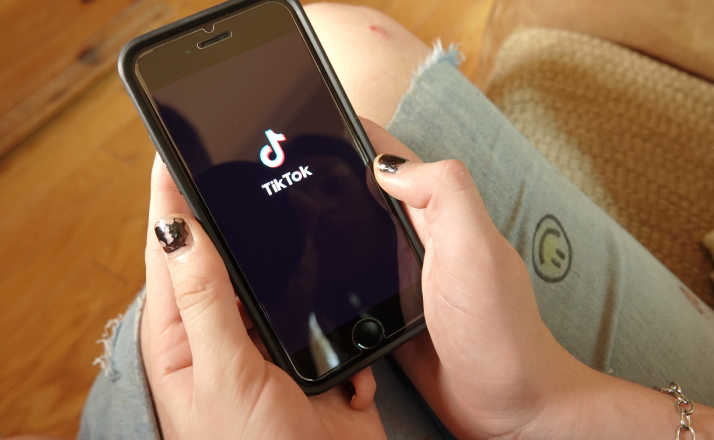The internet has become the go-to place for finding out what ails you. Although doctors advise against it (for good reason), I think we’ve all been guilty of consulting Dr. Google a time or ten…thousand.
Wondering how to get rid of hiccups? Google it. Feeling tired all the time? Ask your favorite Facebook group. Feel like you may be suffering from a personality disorder? Turn to TikTok.
At least, this is what our teens are doing. And it’s downright dangerous.
A new trend has teens turning to TikTok to self-diagnose serious mental disorders, and kids, STOP IT.
Posts with the hashtag #borderlinepersonalitydisorder have been racking up over 590 MILLION views. Posts with the hashtag #dissociativeidentitydisorder have been watched a whopping 766 MILLION times.
The videos are spreading like wildfire and this has medical experts concerned.
A quick TikTok search reveals that the majority of the videos are of teens/young adults who claim to have these diagnoses. Additionally, there are a number of TikToks that list possible symptoms to watch for and encourage viewers to self-evaluate.
Our teens are watching. And they are being influenced into believing they see themselves.
Doctors across the country are seeing a significant rise in teens self-diagnosing based on what they are exposed to on TikTok.
Dr. Bre-Ann Slay, a clinical psychologist in Kansas City, Mo. told the WSJ that many of her adolescent patients were learning about the conditions on TikTok.
Additionally, Don Grant, executive director of outpatient services for Newport Healthcare’s teen treatment center in Santa Monica, Calif., agrees that TikTok is a problem.
“We have to convince these kids to release their self-diagnoses but when they leave us they go right back into that TikTok community which reinforces their beliefs.”
The reality is that these disorders are extremely rare.
According to the National Alliance on Mental Illness, Only 1.4% of the U.S. adult population experiences borderline personality disorder.
The NAMI defines the disorder as:
“A condition characterized by difficulties regulating emotion.
This means that people who experience BPD feel emotions intensely and for extended periods of time, and it is harder for them to return to a stable baseline after an emotionally triggering event.”
People with BPD have wide mood swings, self-image issues, difficulty managing emotions and behavior, and a pattern of unstable relationships.
In short, if an adolescent is reading this, they could easily say, “This is me.” Because let’s face it, this pretty much sums up typical teen behavior.
Which is why it is almost never diagnosed in teenagers.
As for Dissociative Identity Disorder, aka multiple personality disorder, this is even rarer, affecting less than 1% of the population. Although based on the overwhelming number of TikTokers claiming to have it, you would never know that.
For one teen, Samantha Fridley, watching these videos felt like a mirror of her own existence.
The high-school senior became convinced that she suffered from a personality disorder.
In an interview with Good Morning America, she said:
“I remember seeing these videos on my ‘For You’ page of people saying, like, ‘These are signs that you have this disorder,’ bipolar or borderline, and all these other weird disorders that I’ve never even heard of before.
My mind would be like, ‘Maybe I don’t have just depression and anxiety, maybe I have something else.”
It took months of therapy and a 54-day stay in a Newport Academy residential treatment program, to help her see that she did not have one of these disorders.
Her father, John Fridley, wants other parents to know how dangerous TikTok can be for children with mental health issues.
He told the WSJ:
“We felt for a long time that we were competing with social media. For any child with mental-health issues, to be alone in their room with their thoughts and with TikTok is a dangerous combination.”
TikTok addressed Fridley’s and mental health experts’ concerns in a statement to ABC News, stating:
“We care deeply about the well-being of our community, which is why we continue to invest in digital literacy education aimed at helping people evaluate and understand content they engage with online.
We strongly encourage individuals to seek professional medical advice if they are in need of support.”
No word on them removing any of the videos.
Mental health issues have been skyrocketing over the past couple of years. And no wonder, we’re navigating some seriously crazy times. Sadly, our kids are not immune.

The CDC reports that poor mental health in adolescents is growing exponentially.
And the numbers are sobering. More than 1 in 3 high school students experience persistent feelings of sadness or hopelessness and approximately 1 in 6 youth reported making a suicide plan in the past year.
Having conversations, raising awareness, and de-stigmatizing mental health issues are important.
What’s also important is knowing what our kids are exposing themselves to on social media.
It’s no secret that teens are highly susceptible to suggestion. Their brains are still developing.
And not everyone on social media is authentic. Sadly, a number of the people claiming to have these disorders are likely faking it to garner likes, followers, and popularity, without realizing that the messages they are spreading can be detrimental to the mental health of those who are watching.
Self-diagnosis by anyone, adolescents or adults, can be dangerous and it can be difficult to undo the damage it can reap. If your child does come to you with a concern, it is always best to consult with a doctor.
Let your kids know to leave the mental health diagnoses to the professionals and save the dance videos for TikTok.











